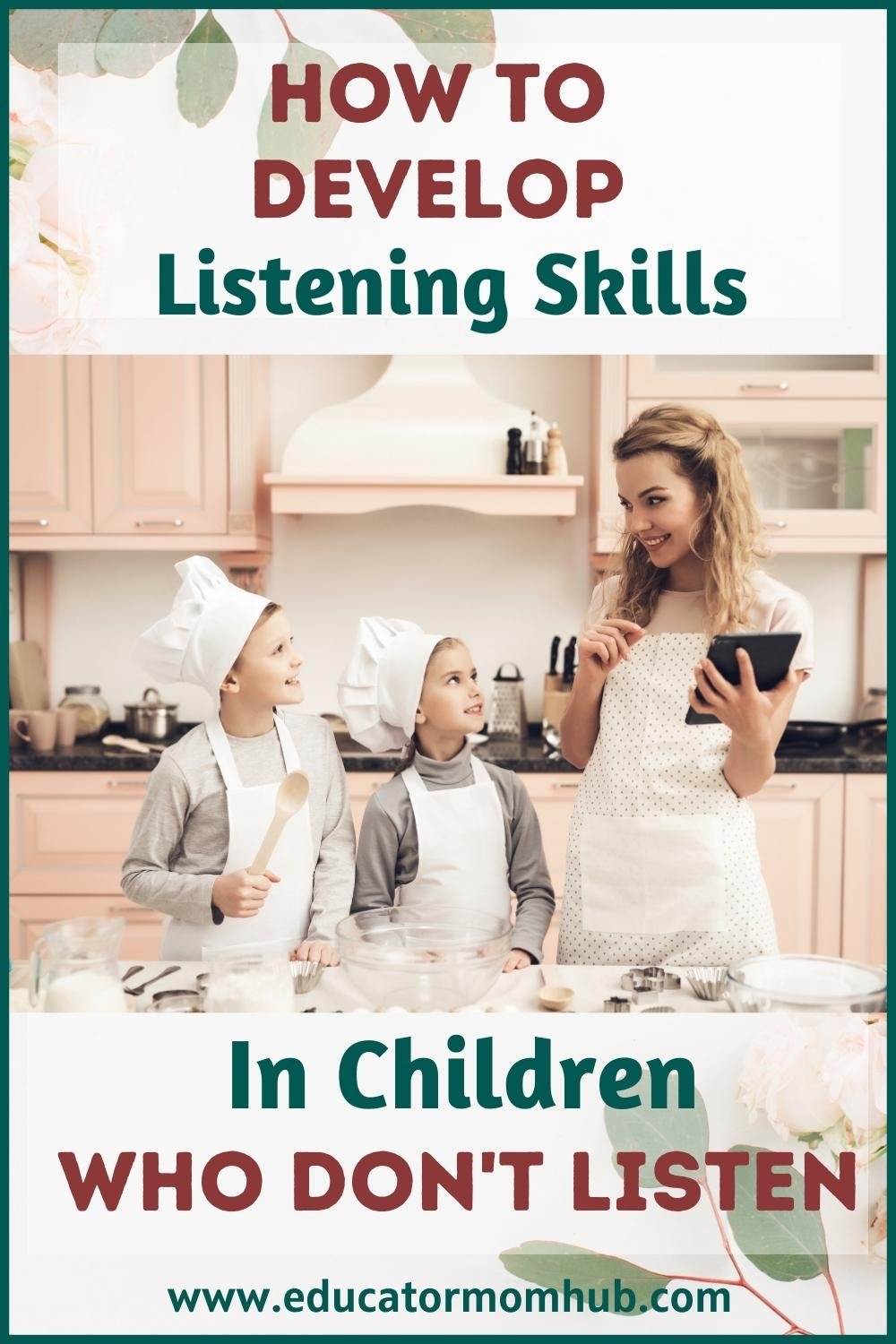How to Overcome Parenting Dilemmas for 4-Year-Olds Who Don’t Listen.
How to Parent a Child Who Won’t Listen- Concerns and Cures
“Why doesn’t my child listen?” seems to be a common complaint from parents of 4-year-olds.
Do you feel constantly ignored when you ask your child to do something?
Do you wish your child would at least respond to you when you speak?
Hmmm……. Maybe, it is time to step back and reconsider if it Is Hearing or Listening that is the Issue.
We must make this differentiation because the Hearing Problem will require medical attention whereas we can work on the Listening problem at home with some special tips and tricks.
To get to the root of this ‘listening problem,’ we must first play this game of elimination. So, let’s first understand the difference between Hearing and Listening.
Hearing vs Listening
Pin this post to Pinterest
Hearing is the ability to perceive sounds – being physically able to hear sounds.
Whereas
Listening is about interpreting/ understanding the information or the words that a child can hear and act upon it.
Next, we must determine the real issue. Is it Hearing or Listening?
How Would I Know If My Child Has Trouble Hearing?
Does your child say “what?” often
Shows signs of hearing fine sometimes but not other times
Watches TV very loud
Turns head or moves one ear forward to listen
Seems he/ she is not paying attention to the conversation around them
Is concentrating too hard when listening
Talks loud
Bangs toys or places them down hard when playing
Does not respond in a timely fashion when playing with peers e.g., often a delayed response (begins running when everyone has already started)- maybe because he/she didn’t hear the word “go!”
Engages in more arguments or fights during play e.g., snatches toy back even if the peer had asked for a turn.
Pretends that they heard you but does something different to what they were asked.
Or follows physical cues more than the verbal instruction e.g., goes to where you are pointing but fails to follow the verbal instruction.
These are some ways you can determine if your pre-schooler has a hearing problem.
What Can Be the Temporary Cause of Hearing Loss in Children ?
Middle ear infection
Excess ear wax
Objects lodged in the ear
Please seek medical advice as soon as you can if you think your child may have a hearing problem. Rest assured all these issues are quite common in young children.
Now, if you think that your child’s hearing is fine but are not sure how to deal with the Listening issue, let’s explore some of the reasons why your child might not be listening.
Why Don’t 4-Year-Olds Listen
One of the reasons could be that your child has not developed skills for listening yet.
Believe it or not, Listening is a skill that has to be taught to children.
How Can Parents Help Their Children Develop Skills for Listening?
Be a Role Model
Be a role model and demonstrate how to be a respectful listener when your child is talking.
Actively listen when your child is talking; make eye contact, ask questions, and respond to their conversation.
In turn, children will learn to give the same respect back to you.
Here is a helpful article- How To Be A Good Role Model To Kids-15 Characteristics
Simplify Your Instruction
Simplify your instruction into just two or three short sentences at a time.
For example, when you say,” go get changed so we can go pick up Toby from day-care,” may sound very complicated to your 4-year-old.
Only say what you would want your child to act upon in that instant.
So instead, maybe you can say, “Go to your room.
Take these clothes off.
Wear the clothes that I put on your bed.”
If your child has trouble following this too, then maybe start with just one sentence instruction at a time.
E.g. Go to your room (once your child calls out an affirmation) continue to the next step.
With practice, your child will be able to retain more information from your instruction and then you can begin to experiment with combined instructions.
This article maybe be helpful to you- How to Talk so Kids Will Listen- 13 Parenting Tips and Effective Phrases to Use
Playing Games Like Simon Says.
If you are not familiar with the game, this is how the game goes.
Your child will have to listen carefully and only follow the instructions that begin with the words ‘Simon says’.
For example, “Simon says clap your hands.” (Your child clapping hands in this instance is correct). If you only said, “clap your hands”, then your child will lose the game.
Games like this help develop keen listening skills.
Cooking Following a Recipe.
This is a good way to practice listening (comprehending and retaining information) and then acting on it.
Cook/Make something together that your child can participate in.
Assign your child tasks that are child friendly, for example, does not involve sharp knives or hot stove.
Read a step at a time to allow your child time to process what actions he/ she needs to take.
Let them be as independent as they can be e.g., find a big bowl, wash the fruit, so that they can practice the skill of listening carefully (processing the information received) and act accordingly upon it.
If your child is not aware of the cooking terms like stir, mix, crack etc.; demonstrate what it means.
When children learn new words(vocabulary), it helps them comprehend conversations better, thus they ‘listen’ better.
Pretend Telephone Conversations
Pretend Telephone Conversations Game is another good way to practice listening skills. (If you are using this game to practice listening skills, ensure that you cannot see each other during this game.)
This way, there will be no visual cues, and your child will have to rely just on their listening skills.
This exercise will help your child sharpen their listening skills; listen with intent.
Always Speak Using Proper Words When Speaking to Your Child.
It might be tempting to use baby talk because your child is so very cute, but it doesn’t help your child develop appropriate language and vocabulary skills.
And so, they may have trouble understanding and following instructions from their Kindy teacher.
Read to Your Child.
Reading is a fantastic way of understanding your child’s listening and comprehension skills.
Make reading into an interactive, ‘guided listening’ session where you will intentionally encourage your child to listen actively by asking questions like; how…, what do you think…, when….., what if…., when did that happen…., etc .
Build some enthusiasm for the reading session first by inspecting the pictures and reading the title together.
Try and reflect on the events of the story together after each paragraph. This will encourage your child to listen with intent, so they can contribute to the discussion.
Asking what, why and how questions during the story will help develop skills for sharing ideas, opinions and imagination.
Basically, by applying the ‘guided listening’ technique when reading, you are helping your child develop listening skills as a life skill.
Here is a helpful article for more information Why Should Parents Read to Their Children Every Day
Have a Real Conversation
Talk about a topic of interest, real life experiences or events , where your child can ask questions, share ideas, and express their opinions.
For example, “What did you like best about seal show?”
The goal here is to have some intent behind the conversation and to actively engage your child in that conversation.
“Why?” Because to effectively engage in a conversation, one needs to listen intently, understand what the other person is saying or asking, before responding appropriately.
This is what you want to achieve with your child. For them to be able to listen, process the information and act upon it
I hope, these parenting tips to help your child develop their listening skills were useful to you.
Here is another article that might be helpful to you How Can Moms Get Kids to Listen Without Yelling
My Sincere Tip
I know as a busy parent myself, that sometimes it is difficult to find time to connect with your child in a positive learning environment where you can implement these parenting tips , especially if you are dealing with bad behaviour and discipline issues.
Sometimes, how we react to our children has a huge impact on how our children react in turn.
Here is a FREE Parenting class that can help you understand your child better and help you get your kids to listen without yelling, nagging or losing control.
Check it out. It’s FREE!!








